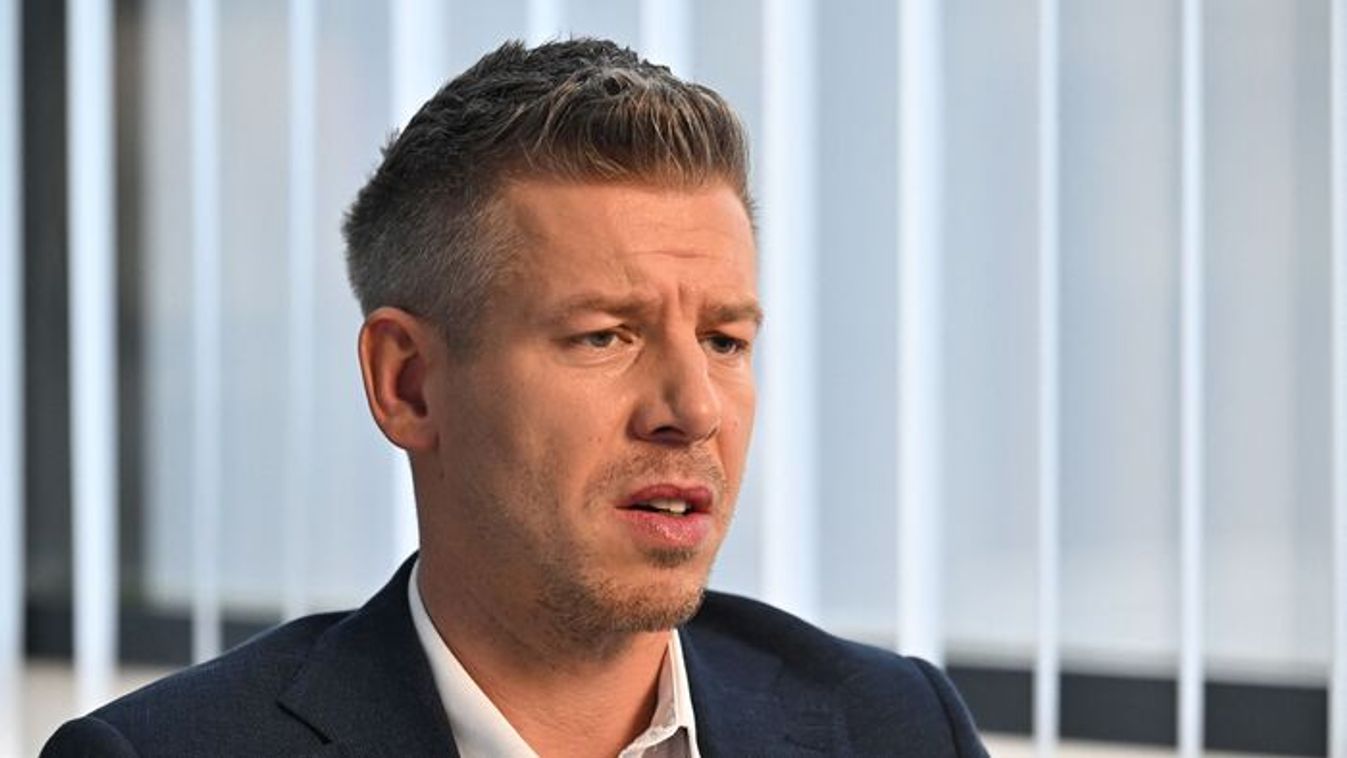Elemző: nem a Fidesz legfőbb érdeke, hogy nyilvánosságra kerüljön Magyar Péter legsötétebb titka

Az sem maradt sokáig rejtély, miért „ijedhettek meg egy ágy képétől” a baloldalon.

“The United States began to follow a different political pattern than Western democracies traditionally had — one that escaped democratic accountability. Certain non-governmental actors, notably foundations, were now licensed to bring about political change — not through the people’s representatives in Congress, but through the courts and the regulatory agencies" – Christopher Caldwell pointed out in a conversation with Lénárd Sándor, researcher at the National University of Public Service.

The past decade as well as the current events in the US show a deep divide in the country. In your new book, The Age of Entitlement, You make the argument that the United States now has two constitutions. How in your view does this divide reflect a rift in terms of the American Constitution as well as of the values of the Constitution?

The book presents a political perspective different than the one most Americans have today. Perhaps it will help if we take the example of political correctness (or “wokeness,” or multiculturalism, or whatever you choose to call it). Why has it come to dominate universities, government, the news media, and the commanding heights of our official culture? Democrats and other progressives tend to believe that there has been a moral, intellectual and spiritual revolution. People who used to practice racism now despise it. People who considered gay marriage ridiculous now consider it just
Republicans and other conservatives believe a peculiar version of that story. They believe that
a narrow minority of culturally influential people has seized control of important cultural institutions,
and promulgated political correctness from there. In other words, they believe the change was a cultural coup rather than a cultural revolution. As Donald Trump’s onetime adviser Steve Bannon puts it: “Politics is downstream of culture.”
He is wrong. Cultural change may drive political change in some countries and in some eras, but in the contemporary United States it is the other way around. Politics drives culture.
Then how is this shift driven?
By a process that began in the 1960s, and particularly with the Civil Rights Act of 1964, which promised to end racial segregation in the most backward Southern states. It wound up going much further than that. It criminalized many hiring practices and educational practices that had previously been considered private matters. It empowered regulators, investigators and judges to prosecute local governments and private businesses for discrimination. Perhaps most important, it encouraged private citizens to bring anti-discrimination lawsuits
This created a second way of governing the country – a new constitution, I would argue.
The United States began to follow a different political pattern than Western democracies traditionally had — one that escaped democratic accountability.
Certain non-governmental actors, notably foundations, were now licensed to bring about political change — not through the people’s representatives in Congress, but through the courts and the regulatory agencies. But this change was authorized to move in only one direction.
The judicial power was believed to be the weakest among the branches of government as Hamilton once pointed out. Did the civil rights era turn this initial belief upside down?
Hamilton meant that the judiciary had no constitutional entitlement to make laws, and no means of enforcing its will against the other branches.
to make law.But certain judges, at certain times, aspire to make law.
In 1954, in its Brown v. Board of Education decision, the Supreme Court ordered a nationwide program of school desegregation, and was obeyed. Because it was obeyed, the court acquired a de facto (not a constitutional) power to make laws, one that opponents of segregation (and eventually progressives more generally) came to rely on. To that extent, Hamilton’s belief has indeed been turned upside-down.
Is it fair to define it as an imbalance between democratic decision-making and decisions imposed by the judiciary?
Yes, I think that is fair. The American founders looked to classical antiquity for a model of how to organize a government. They settled on a tripartite model of executive, legislative and judiciary, assuming that each of these branches of government would be checked by the other. The 20th century American experience has revealed that, in normal circumstances, it is very hard to check a willful judiciary.
Could the judicial politics of the Trump administration change these developments?
Discontent with many aspects of the political system is what brought Trump to power. But the Trump administration did almost nothing to address this problem of what we might call the “two constitutions.” That is no surprise. The administration had a poor understanding of how politics operates in general, no interest in the specific constitutional issues that we have been talking about, and zero expertise in hiring people who might have helped them understand such things. There was no contact with the issue at any level.
Did other Republican administration recognize this problem?
No. That was one of the reasons that my book turned out to be so controversial and perhaps interesting to people. It is not something that politicians tended to talk about.
How do you see the role of the social media as well as the large tech companies in imposing new forms of censorship and making this divide and polarization worse?
We seem to have a privatization of speech enforcement. At this point most of our political speech takes place online, and several social networks are colluding to exclude certain opinions and ideas, and the people who express them. It is worrisome in a similar way to the things we’ve been discussing. Threats to our liberty appear in a slightly different form than the ones our Constitution aims to protect us against, and are easily underestimated.
There are increasing and broadening debates about the uniqueness of the American way of life. Despite of the large divisions you describe in your book, is there an American way of life that unites Americans and if so, what values or rights could be considered as integral parts of this American life? How could American find its back to this unique way of life?
One of the things that Europeans often misunderstand is that the American Constitution — which is the source of the American way of life that you talk about — is an English constitution.
The English constitutional tradition values liberty more than others do.
Its conception of liberty can seem idiosyncratic to continental Europeans. It favors private associations. It does not advance norms but a set of neutral rules. It aims to limit government, humble it — sometimes even to weaken it! (Ours, perhaps, is a constitutional tradition most suitable for countries surrounded by water.)
Because continental constitutions are more normative, they have had an easier time in adapting to the human rights revolution of the 20th century.
There is something incompatible about human rights and the “rights of Englishmen.”
The rights of Englishmen are absolute: they include deciding what goods, norms and values are going to be part of your system of rights in the first place. There is a tension between the Constitution as the Founders wrote it in the 18th century and the concept of rights that arouse in the 20th. This conflict would have come up in any case. But the conflict over civil rights exacerbated it
Since you mentioned the continental Europe, let’s turn to old continent where the challenges do not seem to be less significant. Europe went through a crises period throughout the 2010s. In addition, there are numerous visible cracks in the EU. The crack is visible between the “old” Europe before the Eastward enlargement and the “new” Europe after the Eastward enlargement. How do you see these cracks from overseas?
Pardon me if I draw a parallel between the building of the EU and the building of the United States. The project of our Constitution involved federating thirteen colonies, each of which thought of itself as an independent nation. It was never made clear what the terms of this Federation were: Was it just a bond of convenience that these colonies could withdraw from whenever they wanted, with their sovereignty intact? Or was it an agreement that, over time, those thirteen colonies would be extinguished as sovereign nations, and disappear into the larger entity? Does the federation predominate? Or does the nation? An inability to resolve these questions caused our civil war.
It is a very dangerous thing to leave this issue ambiguous and unclear. So why didn’t we resolve it? Because for the people who wanted a Federation, it had to be left ambiguous. We can see in retrospect that the historical mission of the U.S. Constitution was to extinguish the national claims of the states, an understanding that was imposed formally by the 14th Amendment in 1868, in the wake of our civil war. But if the constituent states of the United States had understood in 1788 that the Constitution would mean the end of Virginians as a people, or the end of Massachusetts as an independent commonwealth, none of them would have consented to it.
The European Union — it is quite obvious to anyone who has studied the history of the United States — is a similar project. Its mission in not just to unite the continent’s nations but to replace them.
This is the most important question at the center of the EU project but almost nobody talks about,
because those who dominate academic and journalistic writing on the EU tend to be sympathetic to the idea of centralization, and they understand that the idea of “replacing” or “phasing out” France or Italy or Hungary would be very unpopular.
However, the European Union recently lost one of its key Member States. The United Kingdom was a strategically and economically important Member State of the EU. What are the lessons and consequences of Brexit?
The presence of Great Britain strengthened the EU in ways commensurate with its size, its military power, its economy, its financial sophistication, and its connections to the world culture. But for the reasons we have been discussing (its different constitutional culture, its idiosyncratic idea of liberty), it also had a moderating influence on the bloc.
Britain’s departure makes the European Union a very different place, and a less free one.
It raises the pressure on Central and Eastern European countries — and on smaller Member States more generally — to conform to the wishes of Brussels.
Besides the United States, Europe has its own debates about a unique European way of life as well as about the values that connect Europeans throughout the continent. In your book titled Reflections on the Revolution in Europe, you foresaw the current European debates a decade ago. How do you see these debates unfolding?
The strength of Europe is its variety. This is what Americans probably envy most about the Old Continent. In the United States, you can fill your car up with gas in St. Louis, drive all day in any direction, and the next gas station you pull into will look exactly like the one you left. In Europe you can wake up in the land of Montaigne and you can walk ten minutes across a bridge and be in the land of Goethe.
This variety has been the source of liberty.
No single power has ever yet been strong enough to subjugate the whole continent for long.
What are the challenges and main responsibility of Europeans to preserve the European way of life?
What binds these diverse civilizations together is, obviously, Christianity. Its hold is weakening.
Without Christianity, there is no European way of life.
There may persist a kind of secularized global capitalism that is familiar to the continent’s elites, but this is not a system of Europe’s creation, nor will it be one in which Europe sets the rules.
On top of that, the demographic situation in all European countries is rapidly deteriorating. In cruder language: Not a single European country is any longer capable (or inclined) to bear a workforce that will permit the continuation of its economy and its culture. To have “responsibility,” you need to have a stable situation, and Europe’s situation appears anything but stable.